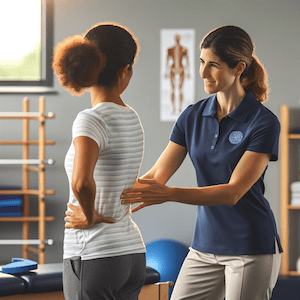Good Back Posture: A Physiotherapist’s Guide
Maintaining good back posture is essential to prevent back pain and promote overall wellbeing. Let’s explore why this is crucial and how you can achieve it.

Why is Good Posture Critical?
Good back posture is vital because it helps reduce the risk of back pain, a common issue affecting millions worldwide. Proper posture ensures the natural alignment of your body, minimising strain on muscles and ligaments during daily activities.
What is Good Posture?
Good posture involves more than just standing up straight. It includes how you sit, stand, and lie down. When standing, keep your shoulders back and relaxed, feet hip-width apart. Engage your core muscles lightly and ensure your head is level, aligning your ears with your shoulders. This alignment prevents undue strain on your neck and back.
When sitting, choose a chair that supports your spine’s natural curves. Keep your feet flat on the floor, with your knees at hip level, and avoid crossing your legs. For those working at desks, an ergonomically designed workspace can significantly improve posture.
Posture Exercises: A Key Element
Regular exercise is crucial for strengthening the muscles that support good posture. Activities like yoga, Pilates, and strength training target the core, essential for maintaining posture. Don’t overlook flexibility exercises—they are vital for muscle balance and preventing stiffness, both key in maintaining good back posture.
Who Benefits from Good Posture?
Everyone can benefit from good posture, especially those who spend long hours sitting or standing. Individuals experiencing back pain, office workers, and even athletes should pay attention to their posture to avoid potential issues.
Where Should You Practice Good Posture?
You should practise good posture everywhere—at home, work, and during leisure activities. Whether you’re sitting at a desk, standing in a queue, or lying in bed, maintaining the correct posture is essential for overall health.
When Should You Correct Your Posture?
It’s crucial to be mindful of your posture throughout the day. Regularly checking and adjusting your posture can help form better habits. Over time, maintaining good posture will become more natural and less effortful.
Incorporating Latest Research
Recent studies highlight the importance of dynamic postures. Regularly changing positions may be more beneficial than maintaining a single ‘correct’ posture, as it reduces the risk of muscle fatigue and strain (Smith et al., 2021) .
Conclusion: Embrace Good Posture
Good back posture is crucial for maintaining overall health. It involves correct alignment in various positions and is supported by regular exercise, ergonomic setups, and posture awareness. By prioritising these elements, you can significantly lower the risk of back pain and enhance overall wellbeing.
What to Do?
If you experience back or neck pain or struggle with maintaining good posture, consult a physiotherapist for personalised advice. They can tailor recommendations to your specific needs, ensuring you achieve the best possible outcomes for your back health.























